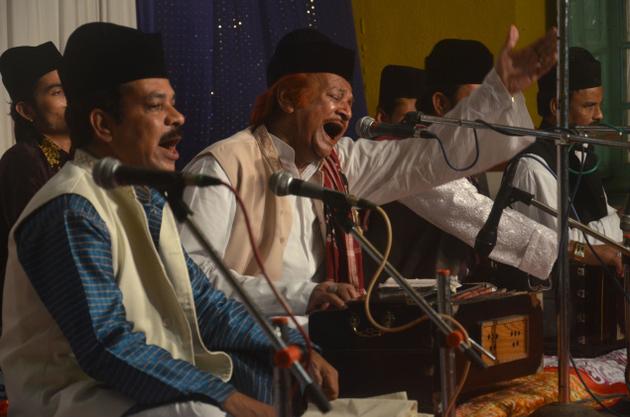By Soumya Bisht, Batch of 2019
“Mashoor har tarah se tera naam ho gaya
Maula kahi Raheem, kahin Ram ho gaya”
As the eldest of the eight Warsi brothers recites these lines, I realize the gravity of the moment . With my questionnaire in hand, I, a person uninitiated to the musical genre of Qawwali, realize how rich the legacy of the family seated in front of me is.
Serenity and poise outlines the Warsi brothers, as they sit cross-legged on the white sheets spread on the floor. The brothers from the culturally-blessed Rampur gharana shared some of their vast expanse of wisdom with The Alliance and its readers. Here’s what they had to say about Qawwali, the promotion of Indian culture in India and abroad and among the younger generation, and more.
To begin with, could you enlighten our readers about the Qawwali genre of music and its origins?
Qawwali is the recital of the ‘Qaul’, which are the words of the Prophet. The foundation stone for qawwali was laid by Amir Khusrau. India had been a land of music since time immemorial, but it was Khwaja Moinuddin Chishti of Ajmer Sharif who introduced Qawwali in the country. Qawwali progressed through the years, aided by the likes of Khwaja Qutbuddin Bakhtiar Kaki, Mehrauli Sharif and his successors.
We merely recite the praises of champions and the learnings of our ancestors, thus continuing the legacy of the great fakirs.
The art of music is the gift of the Almighty, who showered his blessing upon the accomplished sufi singers who came to this country.These artists passed their wisdom to their successors through the years. and it is their experiences and teachings that shall live on, forever.
Amir Khusrau was an incredibly gifted musician and a master of words. It is his creations that are recited today across countries around the world. It should also be noted that the Qawwali, at its best, is found only in India.
What makes Qawwali distinct from other forms of classical music, such as dhrupad and khayal?
It is imperative that it be known that neither qawwalis nor ghazals are sung; they’re recited. Ragas, tappa, khayal and dhrupad are forms of music which are sung. Qawwali is no different from these forms, having the establishments of a classical form of music. It is famed all across the planet and there isn’t any country that is unaware about it.
How do you find today’s generation’s interest in Qawwali ? Do you perhaps, feel the need to promote the form of music more?
Our present generation has progressed far too fast for us to comprehend, without realizing that they are nowhere close to our ancestors, when it comes to experience or achievements. They blatantly ignore the teachings of their elders. Perhaps later in life, today’s kids will realize how indispensable the advice of their elders were.
To convey this message, we travel to different countries; to teach the values which are the true wealth of our country. Our future generation is being swept away by a tide of westernization and their ties to the Indian culture is being loosened. We wish for our future generations to take an interest and indulge in our traditions and our Qawwali.
With the advent of technology, translations and recordings of the qawwalis can be found readily, which can be pivotal in promoting it among the younger generation.
You have traveled far and wide to spread wisdom through your Qawwalis. Is there anything remarkable that you experienced in any of your tours ?
To recollect all that we have experienced and witnessed during our tours would be quite an impossible task. But what needs to be pointed out is the fact that Indian music has a sea of admirers. The Indian classical singers and their music is widely appreciated and respected in many countries. Western countries have their own forms of music, but still they look forward to learning Indian classical music. By God’s grace, the sweetness inherent in Indian music is unparalleled.
Having traveled to so many different countries, India still remains the closest to our hearts. The satisfaction that comes with performing in one’s own motherland is singular.
Qawwali is a devotional form of music that was originally performed in dargahs, but in the present times, it is seen majorly as a stage performance. How are the two experiences different for you, as an artist ?
Before stepping into a dargah or a mandir, people temporarily cast aside their worldly problems and approach with the sole motive of surrendering themselves to the Almighty for a tiny fraction of their day. Qawwalis are recited in dargahs while sitting on the ground. When it comes to stage performances, both qawwals and their audience are seated on chairs. No matter how small this difference may seem to be, it has its own emphasis. The effect of spirituality and calm can be generated during the stage performance but it still isn’t half as intense as a qawwali recital in a dargah is. The simultaneous conversations with God during a qawwali at a dargah is an overwhelming experience that cannot be recreated on stage. We, however, love to recite qawwalis anywhere and everywhere.
Lastly , what do you have to say about the roles of organisations like SPIC MACAY in promoting our culture and traditions ?
It is an absolutely wonderful initiative for spreading awareness about our customs and traditions. The credit, of course, goes to Dr. Kiran Seth (Founder-President, SPIC MACAY). The aim of the organisation is similar to ours, to pique the interests of youth worldwide in the Indian culture and qawwali. It is essential that people stay rooted to their culture. Thus, I’d like to express my gratitude to SPIC MACAY for this opportunity to perform in a college like NSIT.


